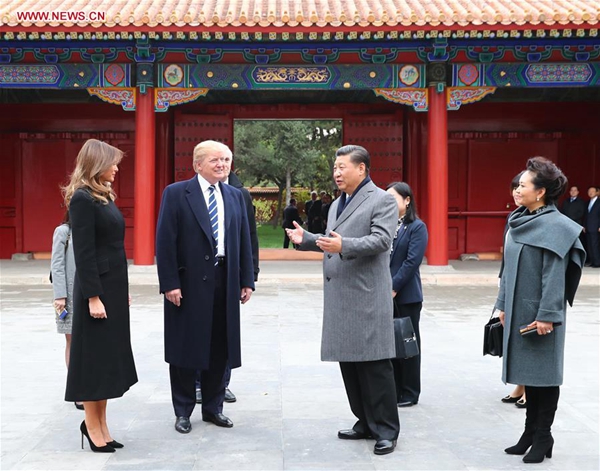Trump and Xi make positive start on new relationship
- By Sabena Siddiqui
 0 Comment(s)
0 Comment(s) Print
Print E-mail China.org.cn, November 14, 2017
E-mail China.org.cn, November 14, 2017
 |
|
Chinese President Xi Jinping (2nd R) and his wife Peng Liyuan (1st R) welcome U.S. President Donald Trump (2nd L) and his wife Melania Trump at the Palace Museum, or the Forbidden City, in Beijing, capital of China, Nov. 8, 2017. They had an informal afternoon tea in the Baoyun Building, also known as the Hall of Embodied Treasures, in the southwestern corner of the Forbidden City. [Xinhua/Xie Huanchi] |
The world's "most important bilateral relationship" made a positive new beginning with President Trump's state visit to China. The bonhomie produced bodes well for the world as they oversee one-third of the world’s economy, a quarter of its trade and command its two most powerful armies.
Having achieved a landmark consensus on China-U.S. relations, President Xi Jinping announced: "The meeting between myself and President Trump sets the tone and lays a solid foundation for the solid development of the China-U.S. relationship. It will achieve more results and more benefits for people around the world."
Amid the good vibes, President Trump was optimistic that the two countries could effectively resolve problems in the world together, and looked forward "to building an even stronger relationship."
Regarding the trade imbalance, he surprised some by saying: "The U.S. really has to change its policies because they’ve gotten so far behind on trade with China, and frankly with many other countries.” He affirmed to President Xi that, "It's too bad past administrations allowed it to get so far out of kilter. We'll make it fair and it'll be tremendous for both of us."
And tremendous it has already been, with 37 major China-U.S. deals worth US$253.5 billion signed in fields as diverse as LNG supply, banking and aviation; one gas deal alone is worth a massive $43 billion. The names of the companies involved – such as Caterpillar, Boeing and Goldman Sachs – are stellar performers on the world stage.
Thus, Trump was able to prove himself as someone who had achieved more than any other America leader visiting China.
Notably, the joint fund deal between the China Silk Road Fund and Goldman Sachs could bring U.S. businesses into the Belt and Road Initiative, especially as this powerful American bank has considerable clout in American politics.
Moreover, the $43 billion investment by Petrochem China in joint gas exploration projects in Alaska, is one that should help reduce the huge trade deficit with the U.S. and thus meet Trump's goals set out from day one of his administration.
Opening up financial institutions to 51 percent ownership by foreign entities, China will provide established foreign banks the opportunity to enter its domestic market in a significant way. And, due to mutual efforts and four-level dialogue, China and the U.S. will be increasingly inter-connected in the coming days.
Being a businessman, Trump has long wanted to benefit from U.S.-China economic ties in a way that major challenges such as the massive $350 billion bilateral trade deficit can be addressed. Having set a 3 percent growth target to rebuild America's collapsing infrastructure, restore manufacturing sectors and reduce unemployment, these trade deals should help to improve his political standing at home.
As it is, Chinese companies have invested $20 billion in nine American states, creating 45,000 jobs and the leading recipient of Chinese investment abroad is undoubtedly the U.S., which "received over $160 billion between January 2005 and June 2017."
Being intertwined to a great degree, both economies need stability at the national and international level for continuous economic growth. Enhancing co-operation on bilateral issues is beneficial for these top trade partners which already have annual two-way goods trade worth $578.6 billion and at least $60 billion of mutual foreign direct investment.
Symbolizing the inseparable nature of their ties, both countries were dubbed "Chimerica" by the historian Niall Ferguson and economist Moritz Schularick. Having created history, it is important that the positive impact from these deals is retained and made sustainable; mutually-acceptable solutions must be found and a workable trust level must be promoted.
Even where foreign policy is concerned, the two nations are finding some common ground. There was a Trump-Xi agreement over nuclear non-proliferation and de-nuclearization of North Korea, assistance to Iraq and standing by the "Afghan-owned and Afghan-led" way to realize that country’s peaceful reconstruction.
This is a promising omen for the world, as a good understanding between the U.S. and China remains the prerequisite for world peace and security. In a chain reaction, any friction between the two trickles down to many other countries.
Even as critics recognize U.S.-China ties as the most important relationship of the century, some identify grey areas. As Professor B.R. Deepak from the J N University in Delhi has said: "Both sides are likely to engage in pragmatic cooperation beneficial to them, for the relationship has to be that of mutual benefit as the stakes are too high on both sides.”
Even as goodwill prevails, compatibility has to be achieved between the economic and geopolitical interests for lasting peace. At the end of the day this "most important bilateral relationship" has the potential to change the world and remaining realistic and constant is the key.
Sabena Siddiqui (Twitter: @sabena_siddiqi) is a foreign affairs journalist and lawyer based in Pakistan.
Opinion articles reflect the views of their authors, not necessarily those of China.org.cn.






Go to Forum >>0 Comment(s)